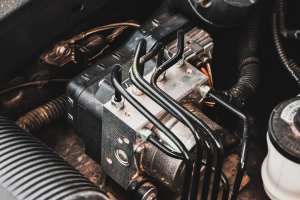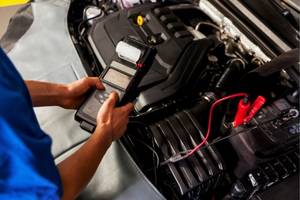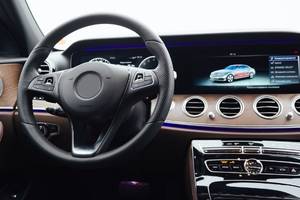Introduction
Welcome to the fascinating world of automotive electronics! If you've ever wondered how your vehicle maintains ideal performance and comfort, you're not alone. At the heart of these functions are two important components: the Engine Control Module (ECM) and the Electronic Control Unit (ECU). Think of the ECM as the specialist, making sure that your engine runs smoothly, while the ECU acts as the general manager, supervising several vehicle systems to keep everything in harmony. Understanding the roles and differences between these two modules not only gives you a deeper appreciation for modern automotive technology but also helps in diagnosing issues and making informed decisions about your vehicle's maintenance.
1. ECM: A Brief Overview
The ECM, or Engine Control Module, is the expert that conducts your car's performance orchestra. It's the brain behind the engine management system, calling the shots for various components to make sure your vehicle runs smoothly.
So, how does it work? Picture this: you're cruising down the highway, and suddenly you need to overtake. You press the accelerator— and the ECM springs into action. It takes this input, plus data from multiple sensors, to adjust the fuel-air mix, ignition timing, and other parameters for ideal engine performance. Essentially, it takes the raw data, processes it, and gives orders like a seasoned army general making sure the victory on the battlefield.
Some specific roles of the ECM include:
- Fuel Injection: Improves fuel efficiency by controlling the injectors' timing and pulse length.
- Ignition System: Instructs when the spark plugs should fire to start the combustion process.
- Idle Speed: Adjusts the throttle position to maintain a steady idle speed.
- Variable Valve Timing: Alters the timing of the intake and exhaust valves opening to enhance the engine performance.
Understanding the role of the ECM gives us a great starting point to appreciate the difference between ECU and ECM. So, with the ECM explained, let's move on to the other player in this comparison — the ECU. Stay tuned!
2. ECU: A Quick Look
Shifting gears from the ECM, we now turn our attention to the ECU. The Electronic Control Unit (ECU) is like the central nervous system of your vehicle. If the ECM is a specific army general, then the ECU is the high command center, supervising the entire operation.
Now, you might be thinking— isn't that what the ECM does? Here's where understanding the difference between ECU and ECM comes into play. While the ECM focuses entirely on the engine, the ECU has a broader scope. It manages not only the engine but also the subsystems like the transmission, brakes, power steering, and even the air conditioning.
Here's a quick rundown on some of the critical functions of the ECU:
- Engine Management: Similar to the ECM, the ECU controls factors like fuel injection, ignition system, and idle speed. It's like the big brother, stepping in when needed but allowing the ECM to handle the engine's everyday operations.
- Transmission Control: The ECU determines when to shift gears for automatic transmissions, making sure a smooth drive.
- Anti-lock Braking System (ABS): In slippery conditions, the ECU modulates the brake pressure to prevent wheel lock-up.
- Climate Control: Feeling too hot or too cold? The ECU manages the temperature inside your vehicle for eventual comfort.
As you can see, the ECU has a more exclusive role within your car's electronic system. But don't let this complexity intimidate you. Understanding its functions, along with those of the ECM, is key to grasping the difference between ECU and ECM. Up next, we'll dive in deeper into their unique characteristics and roles. Let's keep rolling!
3. Comparing ECM and ECU: Key Differences
Now that we've got a grasp on what ECM and ECU are, it's time to clear up any confusion and focus on the key differences between ECU and ECM.
To start, let's think of the ECU as the headmaster of your vehicle's electronic school. It manages all the classes—or subsystems—within the school. The ECM, on the other hand, is more like a dedicated science teacher. It's an expert in one particular field—engine control—and it focuses on making that class the best it can be.
Here's a summary of their main differences:
Scope of Control: The ECU is the big boss, controlling a wide range of systems within your vehicle. The ECM, however, is just one part of the ECU's team, focusing entirely on the engine management system.
Complexity: Given its broader role, the ECU is generally more complicated than the ECM. It needs to manage multiple systems, each one with its own unique requirements.
Interaction with Other Systems: The ECU interacts with almost every electronic system in the vehicle, while the ECM mainly communicates with the engine and related subsystems.
Replacement Costs: If you're worried about your wallet, take note. Replacing an ECU can be more expensive than replacing an ECM, given its more complicated nature.
So there you have it—some of the key differences between ECU and ECM. Now that we've got that sorted out, let's move on to some real-world applications of these two important components. Buckle up, because it's about to get even more interesting!
4. Practical Applications: ECM vs ECU in Real World Scenarios
Alright, time for a little road trip! Let's take a look at how the difference between ECU and ECM plays out in real-world scenarios.
When Things Heat Up: Temperature Control
Imagine it's a hot summer day, and you're cruising down the highway in your trusty vehicle. All of a sudden, you realize it's getting a bit too toasty in the car. You reach for the air conditioning controls, and with a sigh of relief, you feel the cool air flow. That's your ECU at work, managing the climate control system in response to your inputs.
The ECM, on the other hand, is busy making sure your engine doesn't overheat in the hot weather. It's adjusting the fuel-air mixture and ignition timing to keep the engine temperature just right.
It's a Bumpy Ride: Suspension Management
Ever wonder how your car handles those annoying potholes so well? That's your ECU again, managing the vehicle's suspension system. It adjusts the suspension based on the road conditions, giving you a smoother ride.
The ECM, though, is more concerned with how the engine responds to these rough conditions. It adjusts the engine parameters to make sure ideal performance, even when the road gets a little rough.
Suppose you're a bit of a speed demon (within legal limits, of course) and you've decided to tune your vehicle for better performance. The ECU is your go-to component here. By adjusting the ECU settings, you can improve acceleration, top speed, and overall engine performance.
The ECM plays a part here too. By imrpoving the engine control parameters, the ECM can help you squeeze out that extra bit of performance from your engine.
So there you have it – a few practical examples showing the difference between ECU and ECM in action. Just remember, while the ECU and ECM have their own roles to play, it is their teamwork that keeps your vehicle running smoothly!
Conclusion
In summary, both the ECM and ECU are essential to smoothen the operation of your vehicle, each playing a unique role in making sure performance, efficiency, and comfort. The ECM focuses specifically on engine management, fine-tuning parameters to enhance performance. Meanwhile, the ECU oversees a broader range of systems, including transmission, braking, and climate control, coordinating these elements for a balanced driving experience. Recognizing how these components work individually and together improves your understanding of vehicle technology and prepares you to address any possible issues with greater insight.
FAQs on
ECM vs. ECU : In-Depth Guide
-
1. What is the primary function of the Engine Control Module (ECM)?
Ans.
The ECM, or Engine Control Module, is responsible for managing engine functions such as fuel injection, ignition timing, idle speed, and variable valve timing. It processes data from several sensors to make sure ideal engine performance and efficiency.
-
2. How does the Electronic Control Unit (ECU) differ from the ECM?
Ans.
While the ECM focuses entirely on engine management, the ECU has a wider role, managing multiple vehicle systems including the engine, transmission, brakes, power steering, and climate control. Essentially, the ECU controls the entire electronic system of the vehicle, whereas the ECM is dedicated to engine-specific tasks.
-
3. Can an ECM failure affect other vehicle systems?
Ans.
An ECM failure mainly impacts engine performance. However, because the ECM interacts with several engine-related systems, issues with it can indirectly affect overall vehicle operation, such as poor fuel efficiency, unusual engine behavior, or difficulty starting.
-
4. Is replacing an ECU more expensive than replacing an ECM?
Ans.
Yes, replacing an ECU is generally more expensive than replacing an ECM. This is due to the ECU's complicated role in managing multiple vehicle systems, making it more complex and costly to replace or repair.
-
5. How does the ECU manage climate control in a vehicle?
Ans.
The ECU controls the vehicle's climate control system by regulating components like the air conditioning and heating systems. It adjusts these systems based on inputs from temperature sensors and user settings to maintain a comfortable cabin environment.
-
6. In what scenarios might the ECM and ECU work together?
Ans.
The ECM and ECU collaborate in several driving scenarios, such as during performance tuning or adjusting to changes in road conditions. For example, while the ECM fine-tunes engine parameters for performance, the ECU might adjust suspension settings or transmission control to make sure you have a smooth ride.


